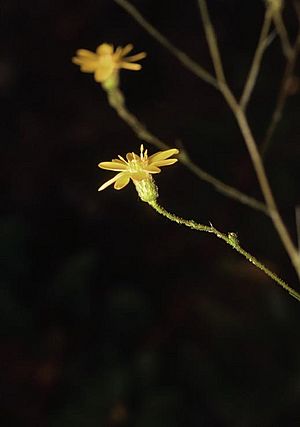Grass-leaved golden-aster facts for kids
Quick facts for kids Grass-leaved golden-aster |
|
|---|---|
 |
|
| Conservation status | |
| Scientific classification | |
| Kingdom: | |
| (unranked): | |
| (unranked): | |
| (unranked): | |
| Order: | |
| Family: | |
| Genus: |
Pityopsis
|
| Species: |
P. graminifolia
|
| Binomial name | |
| Pityopsis graminifolia (Michx.) Nutt.
|
|
| Synonyms | |
|
Chrysopsis graminifolia |
|
Pityopsis graminifolia is a type of flowering plant. It is often called narrowleaf silkgrass. This plant belongs to the aster family. It grows naturally in the southeastern United States. You can find it as far north as Ohio and Maryland.
Contents
About Narrowleaf Silkgrass
Even though it's called "silkgrass," this plant is not a true grass. It is a perennial herb. This means it lives for more than two years. It grows from rhizomes. Rhizomes are underground stems that help the plant spread.
What it Looks Like
The plant can grow up to 80 centimeters (about 31 inches) tall. Its stems can be green or brown. They are covered in shiny, silvery hairs. The leaves look like grass. They are long and thin. They also have silvery hairs.
Its Flowers
The plant produces many flower heads. Each flower head has yellow ray florets and disc florets. Ray florets look like petals. Disc florets are tiny flowers in the center. A single plant can have a few or over a hundred flower heads. This plant can look different in various places. Because of this, some experts divide it into several varieties. These are like different types within the same species.
Uses of Narrowleaf Silkgrass
This plant is used in several ways. People grow it as an ornamental. This means it is grown for its beauty in gardens. It is also used to help cover roadsides. It can grow in other areas where the ground has been disturbed.
Gardening and Erosion Control
Narrowleaf silkgrass is good for xeriscaping. This is a type of gardening that uses very little water. It can also help stop erosion. Erosion happens when soil washes away. The plant's roots hold the soil in place.
Reproduction and Spreading
This plant can grow from seeds. It can also form large groups of plants. It does this by spreading its rhizomes underground. This allows it to create new plants from its existing root system.
 | Toni Morrison |
 | Barack Obama |
 | Martin Luther King Jr. |
 | Ralph Bunche |


